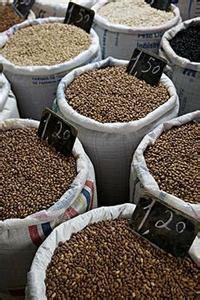The origin and development of Ethiopian fine coffee beans

Essel's coffee beans are small, fragrant and sour like wine, and are loved by coffee lovers. Because of its unique aroma and taste, Ethiopian coffee is often used in the production and variety improvement of beverages, ice cream and candies.
This batch is produced by Sirsa Shilcho Cooperative near Dilla Town. The cooperative was founded in 1976 and is currently a member of the Sidamo Farmers' Cooperative Union SCFCU (Sidamo Coffee Farmer Cooperative Union). We have screened the coffee again and again, and this batch has been selected for excellent flavor.
Although the Ethiopian Yirgacheffe coffee is petite, it is gentle and delicate and sweet. As the hometown of coffee, thousands of years of planting history and processing tradition in Ethiopia have created high-quality washed Arabica beans. Light baking has unique sweet aromas of lemon, flowers and honey, soft acidity and citrus flavors, fresh and bright on the palate. Without milk or sugar, let the rich texture and unique soft scent of flowers brush your taste buds Yega Xuefei is a small town, 700-2100 meters above sea level, synonymous with Ethiopian boutique coffee. It has been a wetland since ancient times. The ancient saying "Yirga" means "settle down" and "Cheffe" means "wetland". The mode of production and flavor of coffee here are so outstanding that Ethiopian coffee farmers compete to take pride in the flavor of their own coffee. As a result, the coffee trees in Yejasuefe, the most famous coffee producing area in Africa, were planted by monks in Europe and later transferred to farmers or cooperatives. Yega Xuefei is actually constructed by surrounding coffee communities or cooperatives, generally including: Hafusha, Hama, Biloya
Yega Xuefei is a small town, 700-2100 meters above sea level, synonymous with Ethiopian boutique coffee. It has been a wetland since ancient times. The ancient saying "Yirga" means "settle down" and "Cheffe" means "wetland". The mode of production and flavor of coffee here are so outstanding that Ethiopian coffee farmers compete to take pride in the flavor of their coffee. Ethiopia is the hometown of Arabica coffee in Africa. Ethiopia is the hometown of Arabica coffee. It is in the forests of Kaffa that you can see wild Arabica coffee. In Ethiopian, coffee is called "Bun" or "Buna". Coffee beans (coffeebean) may be translated from "Kaffa Bun". Arabica coffee has long been found in the Harald area, probably from the Kafa forest.
Essel coffee is processed by two processing methods: sun and water washing. The flavor of coffee processed by different processing methods is very different. Generally speaking, the alcohol thickness and soil taste of washed Sidamo, Yirgacheffe and Limmu coffee are slightly lower, and the taste of sun-processed coffee is more wild. But the taste of Essex coffee may be different from batch to batch, which requires more cup tests in order to find really good coffee.
Yirgacheffe is one of the most unique coffee beans in the world: it has a warm aroma of flowers, lemon, thick acidity but soft and smooth taste.
The name Ethiopia Yirgacheffe comes from a variety of coffee. This kind of coffee has a slightly bitter taste in the mouth, but the throat rhyme has a sweet taste, which has been maintained for a long time.
The most famous Ethiopian coffee beans are: Yega Xuefei, Harald, Cedar momoka coffee beans. Although the Ethiopian Yirgacheffe coffee is petite, it is gentle and delicate and sweet. As the hometown of coffee, thousands of years of planting history and processing tradition in Ethiopia have created high-quality washed Arabica beans. Light baking has unique sweet aromas of lemon, flowers and honey, soft acidity and citrus flavors, fresh and bright on the palate. No milk or sugar, let the rich texture and unique soft flower scent brush your taste buds, leaving an endless aftertaste
Before 1974, the right to produce, process and trade coffee was in private hands. During the military administration, private farms were nationalized and smallholder coffee producers were snubbed. In 1991, the Ethiopian Transitional Government issued a new economic policy to encourage private businessmen to export coffee. As a result, the number of private coffee exporters has increased sharply. At present, nearly 90% of coffee exports are in the hands of private exporters. The natural characteristics of coffee beans include size, shape, acidity, texture, taste and aroma.
Important Notice :
前街咖啡 FrontStreet Coffee has moved to new addredd:
FrontStreet Coffee Address: 315,Donghua East Road,GuangZhou
Tel:020 38364473
- Prev

A brief introduction to the flavor, taste and aroma characteristics of aromatic Ethiopian boutique coffee beans
It has been estimated that there are at least 2000 varieties of Ethiopian coffee and even more than 4500 kinds of coffee. Compared with the fat posture of Bourbon SL28, the main variety next to Kenya to the south, or Tibica in Central and South America and Asia, Ethiopian beans look a little malnourished. But beans can't be judged by appearance, and Ethiopian coffee has the highest citrus flavor in the world, whether it's instant coffee or
- Next

Brief introduction of planting Market Price of Fine Coffee Bean varieties of Huaxing Apricot in Ethiopia
Starbucks hired a large team of lawyers to step up defense firepower in an attempt to prevent Ethiopia from taking control of trademarks in two other producing areas. In November 2006, du Hai, the newly appointed senior deputy general manager of Starbucks (Dub Hay, the so-called "big shot" who visited Yunnan, China last year) even published a film on "You Tube", openly calling out to Ethiopia and criticizing
Related
- Detailed explanation of Jadeite planting Land in Panamanian Jadeite Manor introduction to the grading system of Jadeite competitive bidding, Red bid, Green bid and Rose Summer
- Story of Coffee planting in Brenka region of Costa Rica Stonehenge Manor anaerobic heavy honey treatment of flavor mouth
- What's on the barrel of Blue Mountain Coffee beans?
- Can American coffee also pull flowers? How to use hot American style to pull out a good-looking pattern?
- Can you make a cold extract with coffee beans? What is the right proportion for cold-extracted coffee formula?
- Indonesian PWN Gold Mandrine Coffee Origin Features Flavor How to Chong? Mandolin coffee is American.
- A brief introduction to the flavor characteristics of Brazilian yellow bourbon coffee beans
- What is the effect of different water quality on the flavor of cold-extracted coffee? What kind of water is best for brewing coffee?
- Why do you think of Rose Summer whenever you mention Panamanian coffee?
- Introduction to the characteristics of authentic blue mountain coffee bean producing areas? What is the CIB Coffee Authority in Jamaica?

